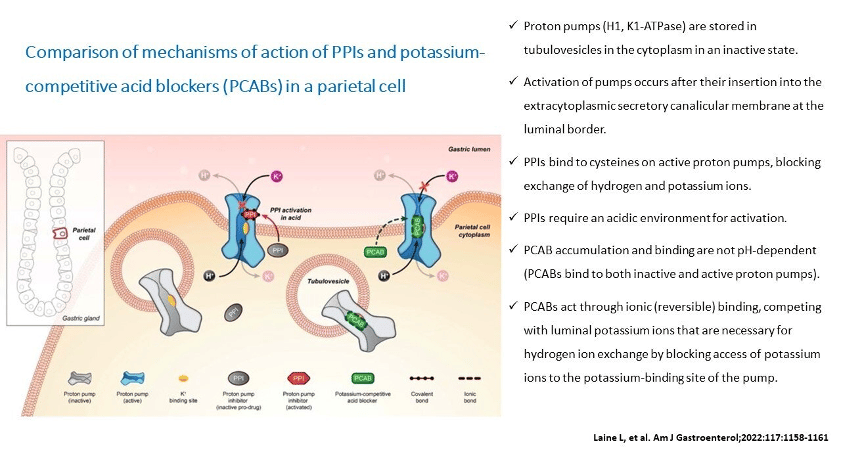Mechanism of action of PCABs (Potasium-Competitive Acid Blockers)

Background:
Conventional proton pump inhibitors (PPIs) are the main first-line therapy to treat acid-related disorders (1). However, they have a number of limitations including slow onset of action, influence by cytochrome P450 polymorphisms, unsatisfactory effects at night, and instability in acidic conditions (1). Potassium-competitive acid blockers (P-CABs) induce a rapid, long-lasting, and reversible inhibition of the gastric hydrogen potassium ATPase, the proton pump of the stomach (1). These agents have a faster onset of action than PPIs, and they have a more sustained action in inhibiting acid secretion. Thus, they represent a new option to treat acid-related disorders. Herby we summarize the mechanism of action of PCABs.
Key Aspects:
- Proton pumps (H1, K1-ATPase) are stored in tubulovesicles in the cytoplasm of parietal cells and are kept in an inactive state.
- Activation of proton pumps occurs after their insertion into the extracytoplasmic secretory canalicular membrane at the luminal border.
- PPIs bind to cysteines located on the exposed site of active proton pumps, blocking exchange of hydrogen and potassium ions (yellow arrow).
- However, PPIs require an acidic environment for activation.
- PCABs bind reversibly to K+ ions and block the H+, K+ ATPase enzyme, thus preventing acid production. PCABs block the access of potassium ions to the potassium-binding site of the pump.
- Importantly, PCAB (Potassium Competitive Acid Blocker) accumulation and binding are NOT pH-dependent, allowing PCABs to bind to both inactive and active proton pumps (red arrow).
New on EndoCollab
Endoscopic Characterisation of Non-Polypoid Lesion in the Cecum

- Introduction
- Steps to Evaluate Lesions
- Morphology
- Surface
- Vessels
- Preliminary Diagnosis
- Paris Kudo
- NICE and JNET Classifications
- Highlights of the Lesion
- Dynamic Evaluation
- Summary of Polyp
- Tip of the Day
- Conclusion
Ref:
1. Oshima T, Miwa H. Potent Potassium-competitive Acid Blockers: A New Era for the Treatment of Acid-related Diseases. J Neurogastroenterol Motil. 2018 Jul 30;24(3):334-344.
2. Laine L, et al. Pharmacodynamics and Pharmacokinetics of the Potassium-Competitive Acid Blocker Vonoprazan and the Proton Pump Inhibitor Lansoprazole in US Subjects. Am J Gastroenterol;2022:117:1158-1161

